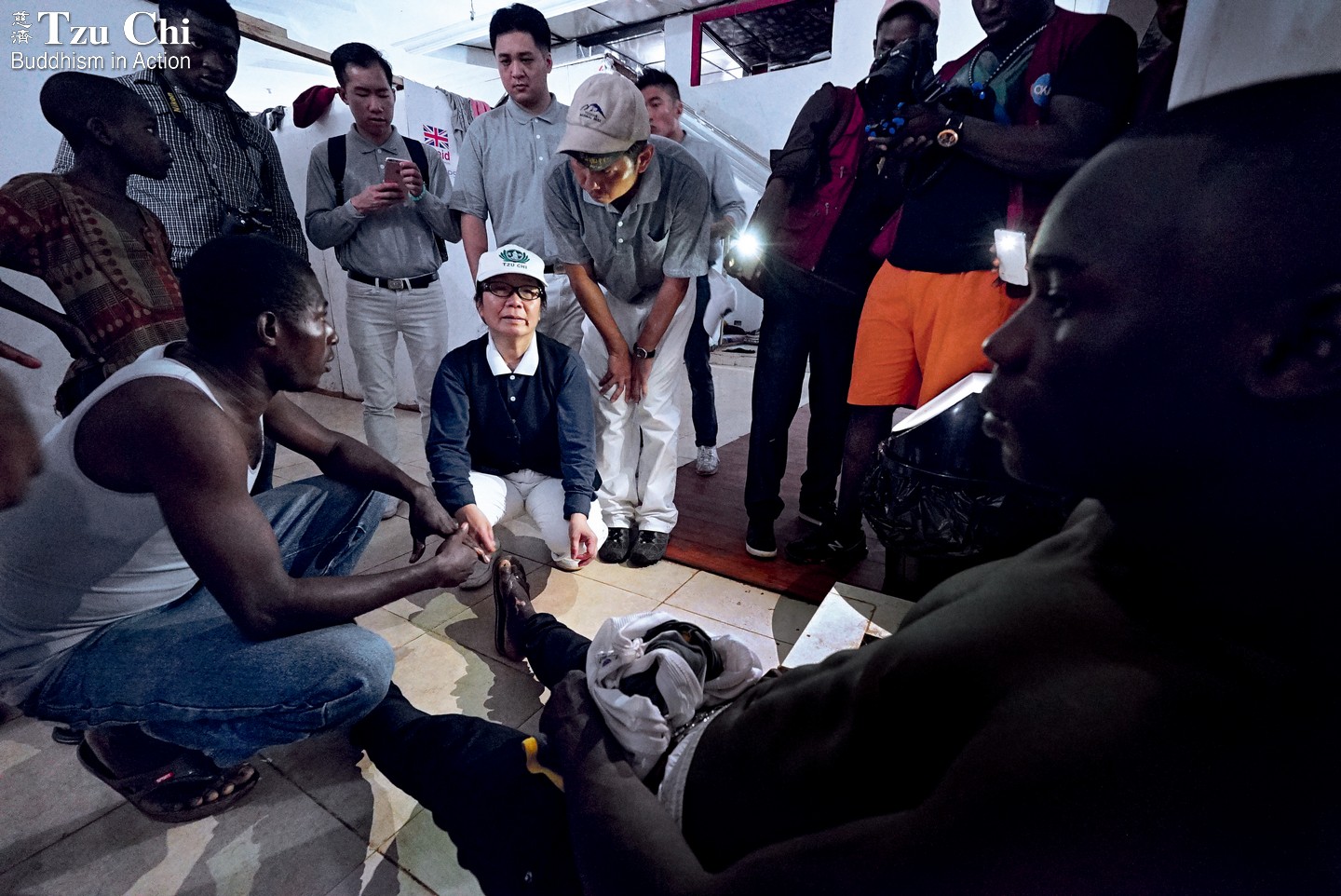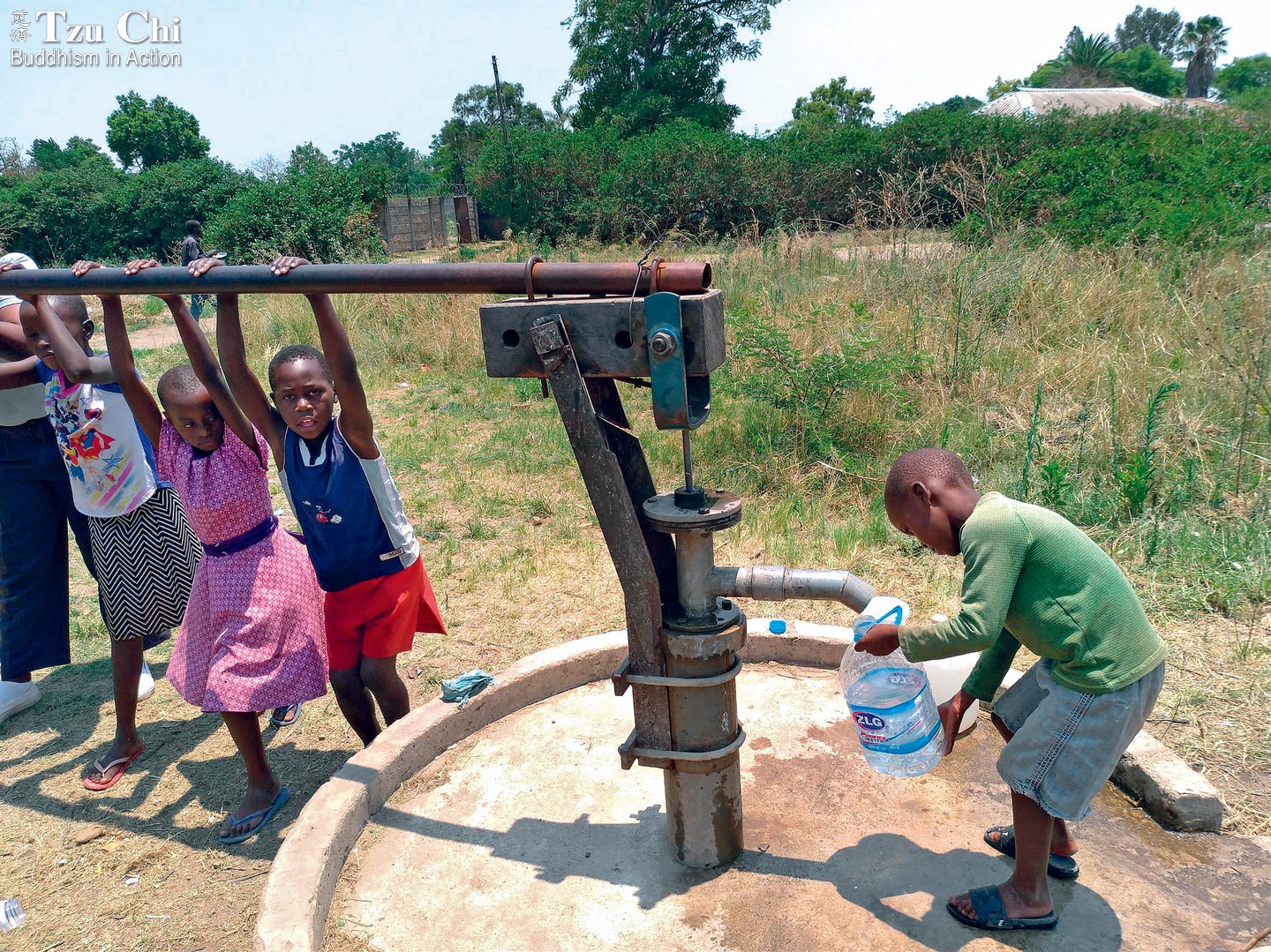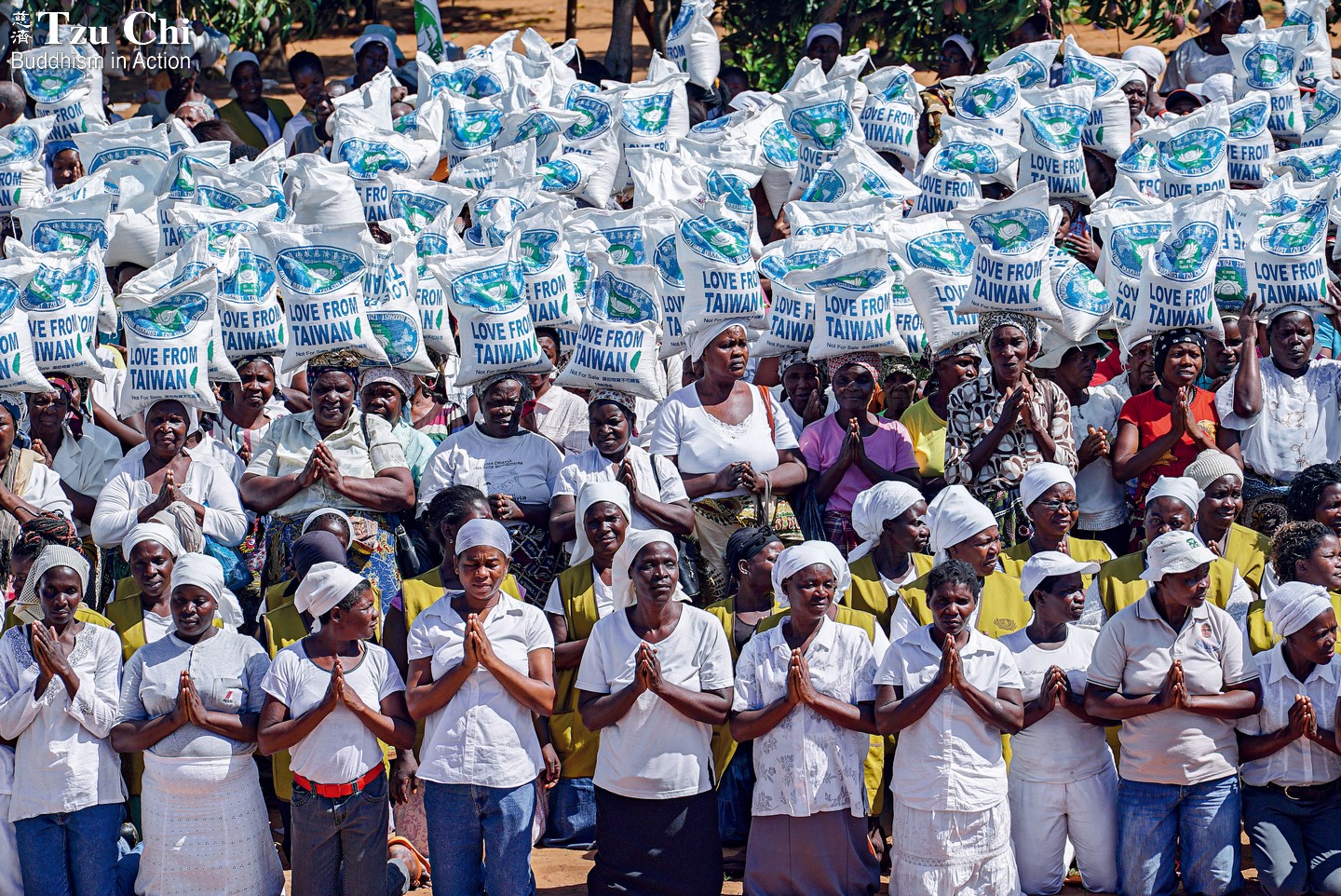Compiled by Tzu Chi Monthly editorial staff
Edited and translated by Wu Hsiao-ting and Steven Turner
Photos by Hsiao Yiu-hwa
Senior Tzu Chi volunteer Debra Boudreaux is a key figure in advancing Tzu Chi’s involvement with the UN Sustainable Development Goals. She has led the Tzu Chi UN Task Force for many years and has shared Tzu Chi’s experiences and recommendations at international forums on issues including humanitarian aid, climate change, environmental protection, interreligious cooperation, and women’s empowerment.
Boudreaux has lived in the United States for over 40 years and is now the CEO of Tzu Chi USA. She frequently represents Tzu Chi at UN meetings and has observed global leaders’ shared concerns about our planet’s sustainability. How does she see the connection between Tzu Chi’s work and the SDGs in terms of relevance, alignment, and integration?

Debra Boudreaux (曾慈慧, below center) assesses needs in a disaster area. She has been involved in international aid for many years and often collaborates with other NGOs to ensure timely delivery of assistance.
In 2015, the United Nations introduced the SDGs. How do these goals align with Tzu Chi’s missions, and where can Tzu Chi enhance its efforts?
Tzu Chi approaches community charity work and other endeavors from the perspective of a religious charity organization, while the United Nations promotes sustainability through international frameworks and global guidelines. The UN established the 17 SDGs in September 2015 to address a wide range of global challenges, including climate change. The urgency of climate change, highlighted by the Paris Climate Agreement in December 2015, further underscored the need for these goals. The SDGs include 169 specific targets that provide actionable and measurable objectives to guide global efforts. Various countries and organizations have launched initiatives to advance these goals. Nearly 4,000 advocacy events have been held globally so far.
Tzu Chi drives community efforts using principles of priority, directness, respect, and practicality, while the United Nations operates on a broader scale with strategies, planning, and promotion. Despite their different operational levels and approaches, both aim to achieve similar objectives. For example, Tzu Chi’s charity work, cash-for-work programs, and the principle of “Eat until you’re 80 percent full and use the savings from the remaining 20 percent to help those in need” align with SDG 1 (No Poverty). Tzu Chi’s promotion of vegetarianism corresponds to SDG 3 (Good Health and Well-being), SDG 14 (Life Below Water), and SDG 15 (Life on Land). Tzu Chi’s efforts in drilling wells and building toilets in Africa to improve sanitation align with SDG 6 (Clean Water and Sanitation). Tzu Chi’s promotion of a circular economy through its recycling and other environmental work corresponds to SDG 9 (Industry, Innovation, and Infrastructure). Finally, Tzu Chi’s collaboration with various organizations to safeguard communities reflects SDG 17 (Partnerships for the Goals).
Tzu Chi’s contributions to the SDGs vary in depth, breadth, and scope. What we need to work harder on is using data from our grassroots community work to illustrate our efforts in relation to the SDGs, leverage these goals to drive community growth and change, and establish a model that other organizations and countries can reference and learn from.
The SDGs are interconnected. In Zimbabwe, a water well provides clean water, enhancing health and well-being while also addressing hunger. Courtesy of Tino Chu

Which aspects of Tzu Chi’s work make the strongest impression on you in terms of alignment with the SDGs?
Our aid programs in Africa address several SDGs: SDG 6 (Clean Water and Sanitation), SDG 5 (Gender Equality), SDG 4 (Quality Education), SDG 3 (Good Health and Well-being), and SDG 2 (Zero Hunger). In Sierra Leone, for instance, our work started with Ebola relief in 2015. We provided instant rice, folding beds, eco-blankets, and advanced public health education. We then expanded our efforts to increase local food production, train midwives, offer women’s health care, and support disaster response to frequent floods and fires. Additionally, we built a solar-powered well for St. Paul’s School for the Blind to ensure access to safe water.
Despite having only a few volunteers in Sierra Leone, we’ve partnered with local organizations like Caritas Freetown, the Healey International Relief Foundation, and the Lanyi Foundation, as well as Taiwan’s Agriculture and Food Agency and international bodies like the United Nations Population Fund and the United Nations Children’s Fund (UNICEF). These collaborations have led to visible improvements in local communities. Though challenges remain, expanding educational opportunities and resources provide hope for significant change in this impoverished region.
Tzu Chi’s aid to Sierra Leone, West Africa, started in 2015 in response to an Ebola outbreak. Over the past nine years, Tzu Chi has partnered with organizations such as Caritas Freetown and the Healey International Relief Foundation to support the needy. This collaboration includes providing hot meals after disasters and enhancing resources for communities and schools.
In 2010, Tzu Chi was granted special consultative status with the United Nations Economic and Social Council (ECOSOC) and started participating in international conferences. Later, Tzu Chi received observer status with the United Nations Environment Programme and served as a co-chair of the United Nations Multi-Faith Advisory Council. From its origins as a charity organization in Taiwan to its current international engagements, what experiences can Tzu Chi offer as references for different sectors to advance the SDGs?
In 2010, Tzu Chi achieved special consultative status with the ECOSOC. That was also the year we first attended the annual Commission on the Status of Women (CSW) conference. Held every March, the CSW conference gathers NGOs and individuals from nearly 200 countries to advocate for women’s rights and gender equality. The event provides an important platform for the exchange of ideas on these issues.
According to UN reports, progress on gender equality has stagnated over the past decade. There are over four billion women globally, with one-third having experienced domestic violence and about 129 million girls not attending school. In light of this, the priority theme for the 68th CSW session this year was “Accelerating the achievement of gender equality and the empowerment of all women and girls by addressing poverty and strengthening institutions and financing with a gender perspective.” The review theme was “Social protection systems, [and] access to public services and sustainable infrastructure for gender equality and the empowerment of women and girls.”
Tzu Chi’s commitment to gender equality is rooted in the foundation’s history. Decades ago, Dharma Master Cheng Yen recognized the challenges faced by indigenous women in eastern Taiwan. In 1989, when Tzu Chi established the Tzu Chi Junior College of Nursing in Hualien, eastern Taiwan, one of its goals was to expand educational and employment opportunities for indigenous girls in eastern Taiwan. The effort to support these girls’ educational aspirations and enhance their social status embodies the core values of gender equality.
And for the past 14 years, since our first conference, Tzu Chi’s UN team has actively promoted the spirit of our foundation’s “Bamboo Bank Era” at the CSW. This period refers to the time when our foundation was first founded, with 30 housewives each setting aside a little of their grocery money every day in a bamboo coin bank to help the needy. From these housewives saving money to female volunteers engaging in humanitarian aid, Tzu Chi’s history aligns closely with the themes of this year’s CSW.
Tzu Chi set a record this year by hosting six meetings at the UN headquarters in New York, along with 20 side events and a special meeting where Tzu Chi’s Mozambique team and UNICEF discussed the care of women and children. Due to our annual participation in the CSW, Tzu Chi now regularly collaborates with five religious organizations to host interreligious meetings.
Over the years, following Master Cheng Yen’s guidance, we, as a member of the international community, have helped identify problems, build consensus, and propose practical actions. For instance, in response to the climate crisis, Tzu Chi joined the United Nations Framework Convention on Climate Change in 2012. Since then, our efforts have included advocating for Ethical Eating Day 111 to promote vegetarianism and contribute to global environmental efforts.
As an observer for the United Nations Environment Programme, Tzu Chi has participated twice in the UN Environment Assembly conference in Kenya, where we shared our environmental protection work. By encouraging recycling efforts through this platform, we have inspired actions by African nations.
The 17th Sustainable Development Goal focuses on global partnerships, aiming to foster collaborations to promote sustainability. The concept proposed by Tzu Chi—“Global collaborations for the common good”—complements this goal.
In response to challenges posed by the COVID-19 pandemic and the Ukrainian refugee crisis, Tzu Chi shifted from direct aid to partnering with UNICEF, providing ten million U.S. dollars to support women and children refugees at the borders. This effort was extended to collaborations with 11 international partners. This year, Tzu Chi has further expanded to 30 partnerships, including Médecins du Monde (Doctors of the World), Caritas Freetown in Sierra Leone, the Camillians, and Food for Ukraine, working together to deliver aid to those in need. Such partnerships underscore the importance of joining forces to make strides towards a more sustainable and equitable world.

Tzu Chi regularly distributes rice to the needy in Mozambique. Many people in this country are impoverished and struggle to afford basic necessities, so this aid provides significant support. Some recipients have even gone on to become volunteers themselves.
What do you think about the current trends and atmosphere surrounding the SDGs at international conferences? With only six years left until 2030 and many goals progressing slowly, do you feel pessimistic?
I recall that during the United Nations Sustainable Development Summit in September 2015, when representatives from 193 UN member states adopted the 2030 Agenda for Sustainable Development, it was declared on-site: “The future of humanity and our planet is in our hands!”
Now we are halfway through the timeline. Progress on more than half of the SDGs is indeed very slow. In fact, 30 percent of countries have seen stagnation or regression, especially in crucial areas like poverty, hunger, and climate goals.
The COVID-19 pandemic, along with the triple crises of climate change, biodiversity loss, and pollution, has hindered developing countries from investing in goals such as good health and well-being and clean energy. Many countries and organizations are overwhelmed by heavy debts.
The aim of sustainable development is to bridge economic and geopolitical divides, restore trust, and rebuild unity. Without significant progress on this widely accepted roadmap, inequality will deepen, exacerbating global divisions and risks. No country can afford the failure of the 2030 Sustainable Development Goals.
Despite the slow progress, the establishment of these goals highlights the necessity of global cooperation to create a better future. Even if progress is slow and challenges remain, taking steps forward is crucial.
The sustainable development of the planet and humanity requires collective effort. Crises can turn into opportunities. Tzu Chi’s role, beyond deepening our community efforts, includes analyzing the data we have available to us and collaborating with academia to share insights and inspire more change through various UN platforms before 2030.
As Master Cheng Yen always says, be mindful in all that we do and proceed with each step firmly and diligently. Let’s keep moving forward. If it’s the right thing to do, just do it.



